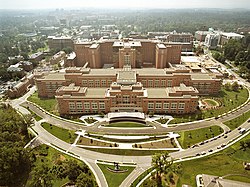Characteristics
Title 42 appointments are intended to attract and retain scientific personnel by providing hiring flexibility and salaries that are competitive with the private sector. However, the authority has been criticized for being overused and for providing salaries that are greater than those allowed under the General Schedule. [4]
Public Health Service
The Public Health Service consists of eight of the eleven agencies within the Department of Health and Human Services that deal with public health. As of 2010, there were 6,697 employees working in Public Health Service Title 42 positions. Of these, 4,879 were in the National Institutes of Health (NIH), 929 were in the Centers for Disease Control and Prevention (CDC), 862 were in the Food and Drug Administration, and 27 were in other agencies. This accounted for 25% of all NIH employees, including 44% of the research and clinical practitioner workforce; 10% of CDC employees; and 6% of FDA employees. The number of Title 42 appointees increased by 25% from 2006 to 2010. There is a total pay cap of $275,000 for Title 42 appointees; about one-fifth of Title 42 appointments pay higher than $155,500 in 2010, which is equivalent to Level IV of the Executive Schedule and the highest pay allowable to General Schedule employees. [5]
As of 2014, Title 42 appointments can last for five years with an unlimited number of extensions. Special consultants under 209(f) are usually appointed as senior officials in the Office of the Director of the relevant agency, while the fellowships under 209(g) are used to hire research scientists and clinicians. In order to hire under Title 42, it must be documented that candidates could not be found through traditional hiring authorities such as Title 5, the Senior Biomedical Research Service, and the Public Health Service Commissioned Corps. However, a small number of high-level positions are exempt from the documentation requirement, including Senior Investigators, Scientific Executives, Institute and Center Directors, and the NIH Deputy Director. [6]
Within NIH, Title 42 appointments may be used to fill Senior Investigator/Scientist/Clinician, Investigator, Staff Scientist/Clinician, Adjunct Investigator, Senior Research/Clinical Fellow, and Research/Clinical Fellow positions. [7] [8]
Within CDC, there are three categories of Title 42 appointment. Regular Fellows are classified as trainees; they must have at least a bachelor's degree and receive pay equal to GS-5 through GS-9 on the General Schedule. Associate Service Fellows and Senior Service Fellows require a master's degree or doctoral degree respectively, plus related post-graduate experience. Associate Service Fellows receive pay equal to GS-9 through GS-12, and Senior Service Fellows receive pay equal to GS-13 through GS-15, with both receiving retirement and insurance benefits. [9]
Within FDA, Title 42 appointments are divided into Service Fellowships, Commissioner's Fellowships, Special Consultants, and Special Government Employees. [10] Service Fellows must have a doctoral degree and are divided into Staff Fellows, who have less than two years of postdoctoral experience, and Senior Staff Fellows who have more than two years of postdoctoral experience. Staff Fellows receive pay equal to GS-9 through GS-12, and Senior Staff Fellows receive pay equal to GS-13 through GS-15. [11] The Commissioner's Fellowship program is a two-year appointment involving coursework and a research project, requires either a doctoral degree or a lower degree in engineering, and pays equivalent to step one of GS-11, 12, or 13. [10] [12]
Environmental Protection Agency

Beginning in 2006, the Environmental Protection Agency has been able to make Title 42 appointments in its Office of Research and Development. [5] This authority was given because existing types of positions were too restricted to either administrative management, advisory functions, and laboratory research, with little flexibility to combine more than one of these; and because the hiring processes were too slow and the salaries uncompetitive. [13]
The authority is generally used to appoint scientists and senior managers; as of 2014, most of the Title 42 appointments were for Division Directors or National Program Directors. The number of Title 42 appointments has been subject to a cap; since 2014 the cap has been 50 appointees at any one time. As of 2013, Title 42 appointees were paid in a band of $130,810–250,000. [14]


